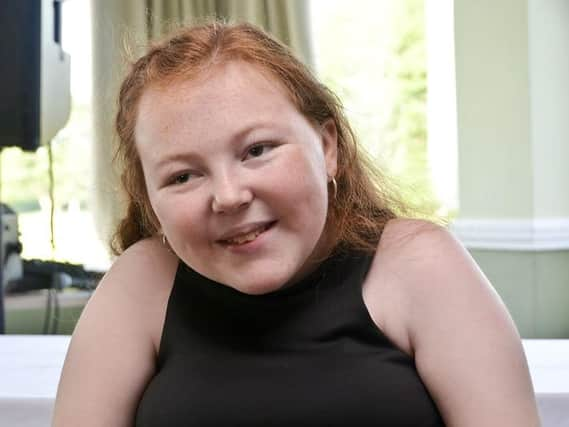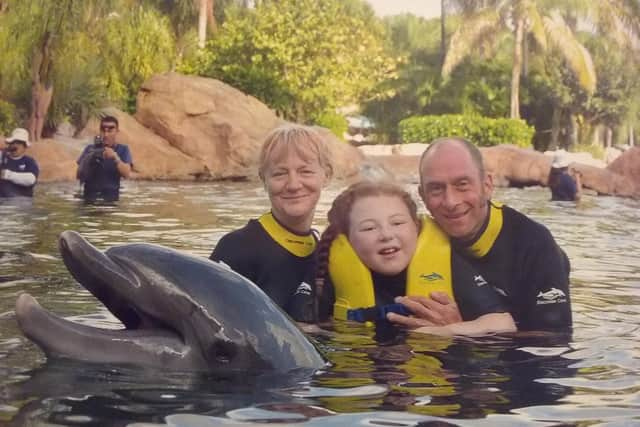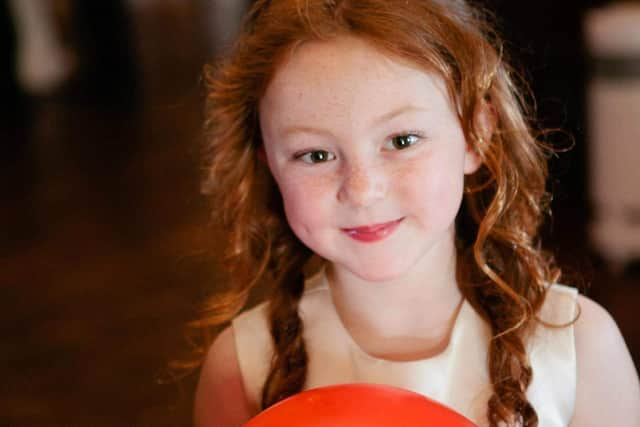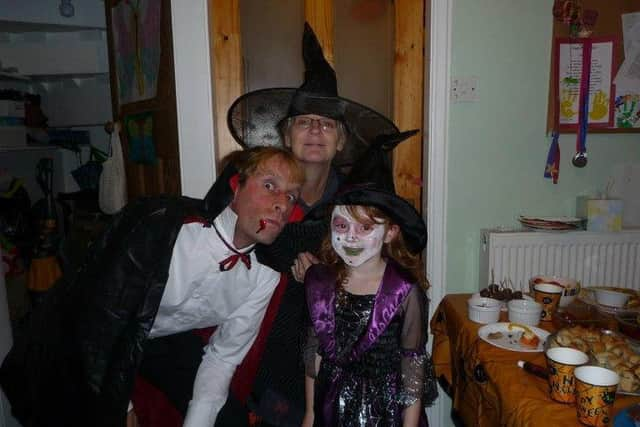Fundraising swim will help raise awareness of rare disease which claimed life of Heysham teen


Gillian Taylor now hopes more people will understand what living with mitochondrial disease is like thanks to a TV soap opera.
The plight of families dealing with the condition is currently in the spotlight as part of a Coronation Street storyline.
Advertisement
Hide AdAdvertisement
Hide AdIn the ITV soap, characters Leanne Battersby (Jane Danson) and Steve McDonald (Simon Gregson) are given the devastating news that their three-year-old son Oliver (played by twins Emmanuel and Jeremiah Cheetham) has the condition.


It is a story which played out in real life for Gillian, whose daughter Elinor passed away in hospital in January at the age of 17.
Gillian said she has not been able to watch the drama on Coronation Street as it is too close to home.
But she hopes the storyline will help raise awareness of a disease which affects one in 4,300 adults yet is still relatively unknown.
Advertisement
Hide AdAdvertisement
Hide AdMitochondrial disease is a genetic condition affecting the body’s energy production, in Elinor's case caused by a combination of a faulty gene in both parents - there is a one in four chance that these genes will cause the condition, and there is currently no cure.


Elinor was diagnosed at the age of 11 after suffering a series of seizures, hallucinations and severe headaches which left her in and out of hospital.
"She had little traits, and I had thought she might be autistic because of the way she interacted, but it wasn't until she had seizures that she was diagnosed," said Gillian, who lives in Heysham with husband Stephan, Elinor's step-dad.
After numerous blood tests to try to determine the cause, Elinor had brain scan, lumbar puncture, EEGs and eventually a brain biopsy.
Advertisement
Hide AdAdvertisement
Hide AdAnd after a lot of negative test results, the family was given the devastating diagnosis in August 2013, when a genetic test taken at the Great North Children's Hospital in Newcastle showed that she had an autosomal recessive genetic condition involving her mitochondria (POLG1 mitochondrial cytopathy).


Gillian said: "It was explained that the diagnosis is life limiting and life changing.
"The condition does not have a typical pattern when diagnosed in someone of Elinor’s age and at that time he could not say if she would live for weeks, months or years.
"Any progress back from Elinor’s deteriorated state of health would be very protracted and where she plateaued he could not determine.
"We were left with a time bomb."


Advertisement
Hide AdAdvertisement
Hide AdElinor went on to miss more than a year of school due to illness, before starting at Morecambe Road School in Year 7.
"She loved that school but she just had no energy," Gillian said. "She spent so much time in bed and she was so isolated - as a parent it was heartbreaking to see.
"She was a growing teenage girl with all the usual interests. Music played a massive part in her life, she loved her music.
Despite her condition causing severe fatigue which often left her in bed for days, Elinor enjoyed life like any teenage girl, especially films, music, swimming and books.
Advertisement
Hide AdAdvertisement
Hide AdShe also loved animals, especially dogs, and the family's two pet dogs, a rescue Golden Retriever called Bailey and Shihtzu cross called Minni, both helped to enhance her life with their companionship.
Along with seizures, ataxia, fatigue and poor mobility, Elinor also had visual impairment which meant she could no longer read as she once did.


"It was very frustrating for her," Gillian said, "but when we were out she was always very dignified."
Elinor's health began to deteriorate last summer, and she passed away in hospital in Newcastle on January 19 2020.
Advertisement
Hide AdAdvertisement
Hide Ad"Last August she started to have twitching that they couldn't control and she was in and out of hospital," Gillian said. "She then started hallucinating and the seizures became intractable [uncontrollable by medicines]."
Elinor was put into a coma after being admitted to the Great North Children's Hospital in Newcastle, after all treatments to control the seizures were exhausted, which she sadly didn't survive.
Elinor would have celebrated her 18th birthday on November 26 - and to mark the date, four of her therapists will be undertaking the Capernwray 500 sponsored swim on Saturday November 7 to raise money for the Lily Foundation - a UK charity dedicated to fighting mitochondrial disease - in Elinor's memory.
Gillian said: "She loved the water and swimming more than anything and Jill Scarsbrick, her lead physio, wants to honour Elinor's memory in this way."
Advertisement
Hide AdAdvertisement
Hide AdYou can donate to the cause online hereGillian added her thanks to everyone who has helped the family over the years, particularly the children's ward at the RLI, district nurses, RMCH and GNCH Newcastle.
FACT FILE
What is mitochondrial disease?
Mitochondrial disease, or 'mito', is the term given to a group of medical disorders caused by mutations in mitochondria, the tiny organelles that are present in nearly every cell in our bodies and which generate about 90 per cent of the energy we need to live.
Cells cannot function properly without healthy mitochondria, so when they fail the consequences can be serious and wide-ranging.
Mitochondrial diseases affect people in multiple ways, depending on which cells are affected. This can make the condition hard to diagnose, as symptoms often resemble those of other serious illnesses.
Advertisement
Hide AdAdvertisement
Hide AdFor example, a person with mitochondrial disease may suffer from seizures, fatigue, vision and hearing loss, cognitive disabilities, respiratory problems or poor growth.
Any of the body's organs and systems can be affected including the brain, heart, lungs, gut, liver and skin. For more information about this see our list of the different types of mitochondrial syndromes.
Is there a cure?
There is currently no cure for mitochondrial disease. However, important steps have been made to make diagnosis faster, easier and less invasive to the patient, and some promising research into effective treatments is underway. The more we learn about mitochondrial disease the closer we will be to one day finding a cure.
For more information about mitochondrial disease and the Lily Foundation, go online hereCoronation Street's coverage of mitochondrial disease
Advertisement
Hide AdAdvertisement
Hide AdThe Lily Foundation have worked closely with Coronation Street on their current storyline about Oliver Battersby, a young boy diagnosed with mitochondrial disease.
And the foundation says this has helped raise awareness about the disease.
They said: "ITV's decision to run a major storyline about mitochondrial disease on Coronation Street, one of the UK's most popular soaps, represents a momentous step forward in raising awareness about mito and the impact it has on families.
"Our charity has worked closely with ITV to ensure the script reflects the experiences of real families affected by mitochondrial diseases.
Advertisement
Hide AdAdvertisement
Hide Ad"The script was reviewed by Lily staff including CEO Liz Curtis, and Prof Bobby McFarland from the Wellcome Centre for Mitochondrial Research, a member of our Medical Board. Families who are supported by The Lily Foundation were also consulted.
"The storyline involves the characters Leanne Battersby (Jane Danson) and Steve McDonald (Simon Gregson), and their three-year-old son Oliver (played by twins Emmanuel and Jeremiah Cheetham).
"Oliver suffers seizures which are first put down to a febrile convulsion, but when the seizures worsen doctors start to fear it could be something more serious.
"Viewers have watched Leanne and Steve struggle to come to terms with the devastating mito diagnosis, which leaves Oliver with a life-limiting illness that currently has no cure.
"The emotional storyline highlights the plight of hundreds of families in the UK, and many more around the world, whose worlds have been turned upside down by mito."
Comment Guidelines
National World encourages reader discussion on our stories. User feedback, insights and back-and-forth exchanges add a rich layer of context to reporting. Please review our Community Guidelines before commenting.